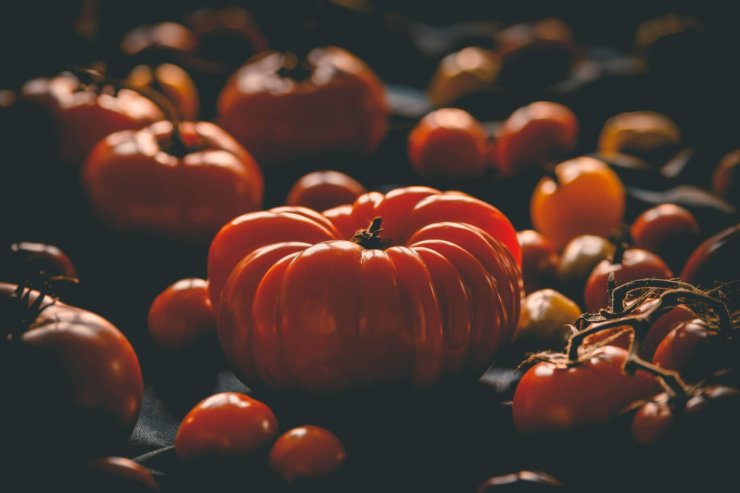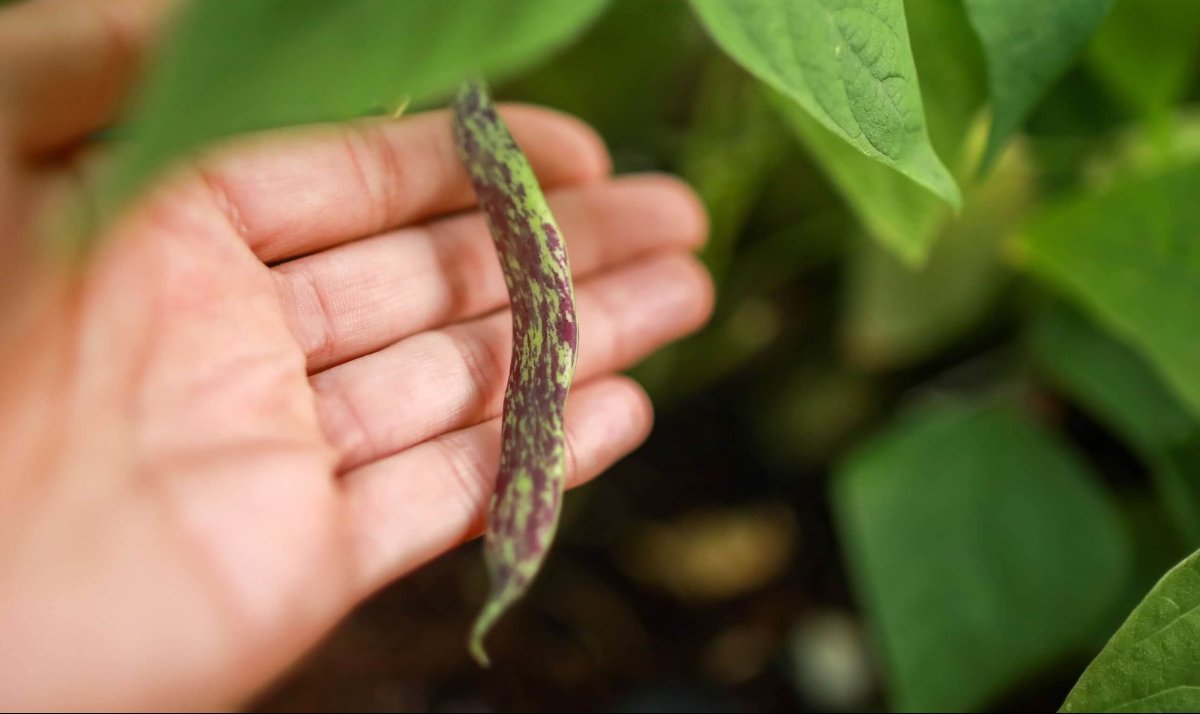
Hi! I’m Amanda, and I’d like to talk about the different types of vegetable seeds. Why? Well, why not? Seeds are tiny miracles. It’s amazing to me that something the size of a tomato seed will, in the right conditions, grow into 10-foot tall, bushy vines that produce pounds and pounds of one of the most popular vegetables ever.
That’s reason enough if you ask me. But there’s another good reason I’m bringing up the different types of vegetable seeds. It’s a question that pops up here and there. So, at the risk of skirting controversy, I’d like to help clear the confusion. Maybe.
As for that controversy, here’s the disclaimer: There are more than three types of vegetable seeds, depending on how you want to define things. For now, I’m referring to hybrid, open-pollinated, and heirloom seeds. You could potentially add organic, conventional, GMO, or even seeds with epigeal and hypogeal germination. But hybrid and heirloom seeds may both be organic or conventional. And GMO seeds are not generally available to the public; they’re reserved for large commercial farms.
Also, there is no strict definition of an heirloom seed, though there are some generally agreed upon characteristics. My point is that you may hear some of these terms tossed about like dandelion seeds on the wind, blowing to and fro. That’s okay. You may also get different definitions of what, exactly, heirloom means. That’s okay, too. We’re all just trying to enjoy the sunshine and grow our food, right? Still, it’s helpful to know what’s going into your garden.
Discover 7 top tips for growing, harvesting, and enjoying tomatoes from your home garden—when you access the FREE guide The Best Way to Grow Tomatoes, right now!

The 3 types of vegetable seeds you might plant in your garden
Back to those three main types of vegetable seeds: hybrid, open-pollinated, and heirloom. So grab a coffee and let’s chat, starting with hybrid seeds.
1. Hybrid. When you buy seeds, you may see hybrid seeds listed as hybrid, F1, or F1 hybrid. These designations are all the same. A hybrid plant has been carefully bred over generations to produce plants that have specific characteristics. For example, the On Deck hybrid variety of corn is bred for growing in containers. It tops out about a foot shorter than traditional corn and matures relatively quickly—around 60 days as opposed to the 80ish days for most full-sized varieties.
Once a grower achieves the desired characteristic, future generations of plants are bred from two parent plants with those traits. The offspring are the F1 (or first generation) seeds you get in a seed packet. Creating a hybrid requires a highly sterile environment, as you need to ensure there is no cross-pollination. A hybrid is, in essence, a clone.
This is a very different process than creating GMO seeds. In the case of GMOs (genetically-modified organisms), scientists are altering the genes of a seed. Hybrid is just selective breeding.
2. Open-pollinated. Seed Savers Exchange describes open pollination as pollination that “occurs by insect, bird, wind, humans, or other natural mechanisms.” Open pollination allows for genetic diversity, and, over time, plants will adapt to local conditions. That’s how we get native plants that are particularly suited to things like limited rainfall, or that have resistance to some pests.
While there may be some variation within open-pollinated types of vegetable seeds, the most adaptive traits are generally dominant. That means that even with genetic variation, your open-pollinated seeds will grow reasonably true to the parent plant. And if you’re saving seeds and want to ensure limited cross-pollination, you can separate different varieties of vegetables.
3. Heirloom. Here’s where things get a little complicated. Although that complication really depends on how strict you want to be with your definitions. But since this isn’t a game of Jeopardy, we’re going to leave plenty of room for interpretation. Most growers agree that all heirloom seeds are open-pollinated. However, all open-pollinated seeds are not necessarily heirlooms.
Most growers also agree that an heirloom seed is one which has been handed down through generations, often within the same family or group of growers.
Here’s where things get tricky and potentially a bit arbitrary. Depending on whom you ask, an heirloom variety should be at least 40 years old, 50 years old, or pre-World War II. Although I recently saw an “heirloom” variety that was only about 30 years old. And then there are places like Seed Savers, which identify heirlooms “by verifying and documenting the generational history of preserving and passing on the seed.”
The University of Wisconsin-Madison calls heirloom seeds “living artifacts and living history exhibits,” which I think sounds beautiful. The University of Kentucky refers to them as “vintage varieties,” which I can also appreciate.
So, heirlooms have some genetic variation, and they are generally adapted to specific local conditions. In other words, they are open-pollinated. The reason open-pollinated seeds are not always heirlooms is primarily due to the age of the variety.
A few common questions
What about organic? Organic vegetables (and herbs and fruits) are produced without chemical fertilizers and insecticides, although there are organic versions of fertilizers and insecticides acceptable for organic vegetables. Organic is simply a method of gardening. Hybrid and heirloom varieties may both be organic or conventional. This goes for open-pollinated varieties, too.
Is hybrid or heirloom better? That, my friends, is a question with no answer. Even though these are different types of vegetable seeds, one is not necessarily better than the other. Generally speaking, hybrid vegetables have more uniformity and traits that may make them preferable for any gardener. For example, a hybrid tomato plant may have good resistance to blight, and the fruits may be all the same size.
On the other hand, heirloom varieties are well-known for tasting darn good (although some hybrid varieties are pretty darn tasty, too). In addition, heirloom fruits may vary in size, even on the same plant. And they rarely have the uniformity of the veggies you’ll find in the supermarket produce section. They also may or may not produce as much fruit as hybrid varieties. Again, though, heirlooms in their native regions may have excellent disease resistance or adaptability to local climate conditions.
Ultimately, whether hybrid or heirloom is better depends on what you want out of your plants. But, of course, there’s nothing that says you can’t grow both!
Can you save hybrid seeds? Sorry to be the bearer of bad news, but saving hybrid seeds is a fruitless effort. Maybe literally. Because hybrids are bred under meticulous, sterile conditions, there’s little chance that the seeds from an F1 hybrid plant will grow true to the parent. Once they get out into the open and cross-pollination and other environmental conditions impact them, the seeds get too much input to grow into what you hope they will.
What are the oldest heirloom seeds? There are several vegetable varieties from the early 1900s and even the late 1800s. The Kentucky Wonder pole bean is from 1864, and the Chioggio beet is an Italian heirloom variety that originated before 1840. Country Gentlemen corn has been around since at least 1890, and lemon cucumbers were introduced in 1894 (and they’re delicious!). The Mortgage Lifter tomato is from the 1940s. The oldest heirloom vegetable I’m aware of, though, is the Round Black Spanish radish. This gorgeous vegetable, with dark, almost black skin and brilliant white flesh, dates to at least the 1500s, if not before. It’s wonderfully spicy, almost in a horseradish-type of way.
How about you? Do you have a favorite hybrid or heirloom vegetable?
Note: Food Gardening Network contains links to affiliate websites, including Amazon and Rakuten Affiliate Network, and we may receive a commission for any eligible purchases made by you through links on this page. Any reviews are based on honest reviews of the products.
Discover 7 top tips for growing, harvesting, and enjoying tomatoes from your home garden—when you access the FREE guide The Best Way to Grow Tomatoes, right now!





This explains why the seeds from my sister’s heirloom tomatoes in Rhode Island, did not do well in my Florida garden, but I can’t stop my Everglades tomatoes from popping up all over my garden and lawn!
Thank you for the info, Amanda!